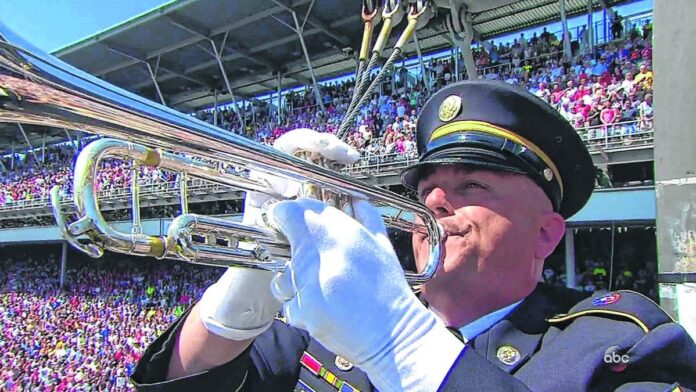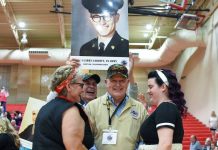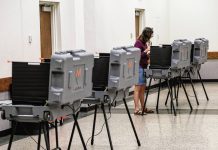
There is a moment, just after being introduced and before he starts playing, that Sgt. First Class Ron Duncan feels the weight of what it means to play “Taps.”
The Indiana National Guardsman has performed it for thousands of grieving families, including his own, in services for Memorial Day and other events and around the world as part of the United States Marine Drum and Bugle Corp., serving in the Marines.
He’s also has played “Taps” during Memorial Day ceremonies at one one of the biggest stages on the planet — The Indianapolis 500.
He never forgets that moment of what he is about to do when he plays “Taps,” a historical bugle call of the military that signals a final farewell.
[sc:text-divider text-divider-title=”Story continues below gallery” ]
While he says playing the 24 sequential notes of “Taps,” which when performed lasts just a bit over a minute, isn’t technically difficult, it can be very difficult when standing alone, looking at the family, or in some cases hundreds of thousands of race fans, and starting that first note from a moment of silence.
At that moment, it is the trumpet player, alone.
“When you put it in front of the family, it becomes hard all of a sudden,” he said. “It can be very difficult.”
That’s because while he has performed “Taps” many times, with each family, including his own, it’s their first time to hear a final tribute to their loved one.
“It’s the last tribute being played for a soldier being laid to rest,” he said. “I want to make it right and make it personal for the family.”
Many Hoosiers may not know Duncan personally, but if they have attended the Indianapolis 500 during the past 10 years, they have heard him play “Taps” from the crow’s nest high above the Indianapolis Motor Speedway, during opening ceremonies.
This year has been slightly different with the delay of the Greatest Spectacle in Racing — the Indy 500 won’t be run until Aug. 23 and a replay of last year’s race this weekend is tiding race fans over until then.
Duncan is the longest-running trumpet player to play “Taps” for the 500 crowd, performing it from above the crowds for a decade.
“I have the greatest job in the world,” he said of the opportunity to play for race fans. “It’s such a pivotal moment,” he said of the emotional Memorial Day tributes performed at the Indy 500, and elsewhere across the country, for Memorial Day.
“You’re playing for all those people who came before us,” he said.
Duncan, who now also teaches elementary band at a school in Ohio, said he tells his students that when performing “Taps,” it’s to “remember all who came before us to defend our freedom.”
“I tell them our freedoms are based on the sacrifices of all those people. Playing ‘Taps’ is when we pause for a moment and remember that.”
Opening ceremonies for the taped replay Sunday were filmed earlier this month at the speedway and Duncan was asked to go over to the race track so his rendition of “Taps” could be filmed, even though this May, the seats were empty.
It was so quiet on the day of filming, Duncan said he could hear the traffic passing by outside the track and nearby construction equipment in use nearby. He described it as “eerie,” and more haunting than a regular race day, with the notes echoing off the empty grandstand seats.
“It sounded completely different,” he said of this rendition. “It added to the solemness of the (bugle) call. It was just a really different sound.”
He will return to the 500 in August, in what may be his last performance of “Taps” there, as he prepares to hand the responsibilities on to the next generation of trumpet players for the Indiana National Guard.
Each year, Duncan brings along a backup bugler to the race, in case he gets in a car accident or something (he joked), and now it’s time to train the next group of trumpet players to take on this responsibility.
“I just want to show him (the backup) the ropes of race day — and help build some relationships,” he said of training a successor for the Indy 500 assignment.
“I have been so fortunate to do this — the (Hulman) family has treated me so well — it’s something I’ve looked forward to every year,” he said.
‘You’re playing trumpet’
Trumpet wasn’t always the dream for Duncan, who said he grew up poor in Virginia — so poor that his family didn’t have indoor plumbing until the early ‘80s. When he was 12 years old and preparing for sixth-grade band, he told his mother he wanted to play trombone.
So she went down to the local pawn shop and didn’t find a trombone, but instead, a trumpet, which she purchased for $50.
“You’re playing trumpet,” she said to Duncan as she handed it to him. And that was that.
His first time playing “Taps” was for his uncle’s funeral — he had learned it on his own and through high school marching band.
But his true education in bugle calls, including “Taps,” didn’t happen until he joined the Marines and was tasked with learning as many as 30 different bugle calls used by the military, and later through the Marine Drum and Bugle Corp.
There’s First Call and Morning Call and Church Call and Liberty Call — all bugle calls that are a throwback to 150 years ago when bugle calls were used on the battlefield to allow generals to communicate with their troops over the sound of battle.
Historically, centuries ago, armies had drug and bugle corps made up in of children who performed the bugle calls, dressed in red uniforms as noncombatants, to send the signals from the generals to the troops, Duncan said. Eventually, opposing armies figured out they would wipe out the communication factor by taking out the buglers and drummers, Duncan said.
The calls are still used on Navy ships today and in military graduation ceremonies, with different calls for different branches of service.
Duncan remembers that when he was serving in the Marines in Washington, part of his duty was to be among a group of 10 trumpet players who would perform “Taps” at Arlington Cemetery for military funerals — he performed “Taps” for 500 to 600 funerals there.
When he arrived to play for the Drum and Bugle Corp. after basic training and boot camp of five to six months, he hadn’t played trumpet in awhile and described himself as a little “rusty.” He had what he described as a “light bulb” moment after his first assignment at Arlington.
At his first assignment to a funeral, he was told to play in the key of B-flat, which is slightly lower than what he was used to and he was trying to get the hang of it. That first performance, he started in, but described it as “totally flubbing” the first few notes.
“I got into so much trouble,” Duncan said of the lesson learned. “There was mandatory practicing for three months. I never messed it up again.”
The trumpet legacy
After the Marines, Duncan eventually joined the Indiana National Guard to be able to spend more time on drill weekends with his brother, who is also a trumpet player.
His son, who also plays trumpet, was also in the Indiana National Guard. The two played together for eight years, performing “Echo Taps” for Duncan’s step-father’s funeral. “Echo Taps” is when a trumpet player starts “Taps” and then is “echoed” or followed by another performer.
When asked what ever happened to that $50 trumpet from the pawn shop in Virginia, Duncan laughed and said he thinks his brother used it for awhile, but he has no idea what happened to it.
But Duncan said purchasing his son Josiah’s first trumpet was sort of similar.
“I got him a professional trumpet, it was just there at Wright Patterson Air Force Base hanging on a wall — a 1950 Olds Ambassador. It’s a great horn.”
As a band director, Duncan gets to watch as young musicians select an instrument to play and begin to learn what playing music can teach them.
He described it as teaching kids to play an instrument as their first chance to learn “multi-tasking” and become comfortable with it.
“I’ve always thought some of the smartest kids are musicians,” he said.
Not enough buglers
This Memorial Day weekend, “Taps” will be performed thousands of times around the United States in tribute to the fallen and in memory of their service.
Duncan acknowledges that in some cases, the performance is pre-recorded and played that way rather than by a bugler who steps forward and actually plays it as a bugle call live.
“There’s just not enough buglers to go around,” Duncan said, saying the need for the playing of “Taps” sometimes outpaces the numbers of musicians available to perform it.
But while “Taps” and other bugle calls have taken Duncan around the world to perform for presidents and heads of state and hundreds of thousands of race fans and an even larger audience through television, he said he never forgets what the actual moment of performing “Taps” is all about.
“It’s the last moment of saying goodbye,” he said. “It’s for the family.”
And what of that $50 trumpet that has been lost to time and performances of long ago?
He hopes that long-ago first trumpet has found its way into another sixth-grader’s hands.
[sc:pullout-title pullout-title=”There are no words…” ][sc:pullout-text-begin]
The Association of the United States Army has written a history of “Taps,” and points out that the bugle call does not have lyrics. However, according to the association, as soon as “Taps” was sounded in July 1862, some began writing lyrics.
The first were, “Go To Sleep, Go to Sleep.” As the years went on many more versions were created. There are no official words to the music but the association says these lyrics are some of the more popular verses that have been created:
Day is done, gone the sun,
From the hills, from the lake,
From the skies.
All is well, safely rest,
God is nigh.
—
Go to sleep, peaceful sleep,
May the soldier or sailor,
God keep.
On the land or the deep,
Safe in sleep.
—
Love, good night, Must thou go,
When the day, And the night
Need thee so?
All is well. Speedeth all
To their rest.
—
Fades the light; And afar
Goeth day, And the stars
Shineth bright,
Fare thee well; Day has gone,
Night is on.
—
Thanks and praise, For our days,
‘Neath the sun, Neath the stars,
‘Neath the sky,
As we go, This we know,
God is nigh.
[sc:pullout-text-end]




